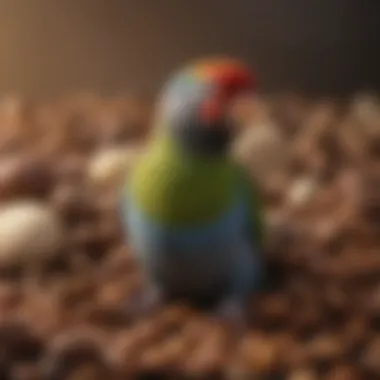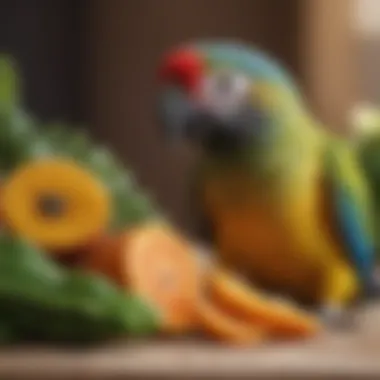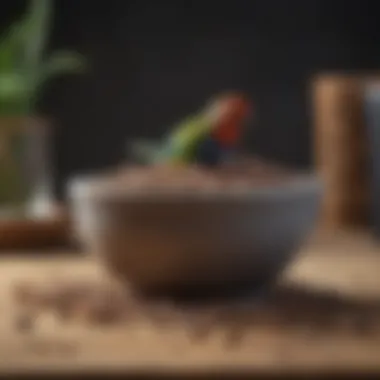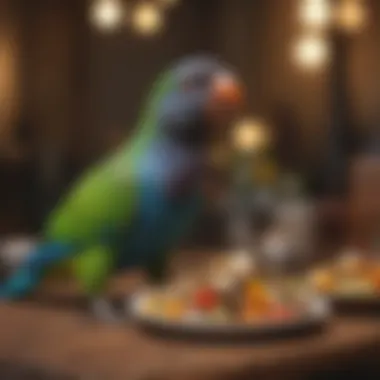Comprehensive Guide to Indian Ringneck Food


Intro
The Indian Ringneck parrot is an enchanting companion known for its vibrant colors and engaging personality. Understanding their dietary needs is fundamental for the health and well-being of these birds. This guide will explore everything related to feeding your Indian Ringneck, ultimately ensuring they thrive in your care.
By dissecting the essential aspects of their diet, food preferences, and feeding practices, we will provide insights for pet owners. Ensuring a balanced diet is critical to preventing health issues and enhancing their life quality.
Get ready to dive into the specifics that will aid you in nurturing your avian friend.
Understanding Your Pet
Pet Behavior Basics
Recognizing the behavior of Indian Ringneck parrots is vital for establishing a healthy relationship. They are known for their playful and intelligent nature. Their curiosity drives them to explore their environment, which means they often interact with their surroundings and can become bored easily.
Common Breed Characteristics
Indian Ringnecks tend to have distinct characteristics, such as a strong bond with their owners. They are also capable of mimicking human speech, which can be fascinating. Their social nature requires interaction, both with humans and, if possible, other birds. These traits can influence their feeding behavior.
Species-Specific Needs
Different species have unique dietary requirements. Indian Ringnecks thrive on a diet rich in vitamins, minerals, and fibers. They typically need a variety of seeds, pellets, fruits, and vegetables to meet their nutritional needs. It's crucial to know what food types complement their natural diet. Educating yourself on these specifics helps in crafting a meal plan that can enhance their health.
Pet Care and Maintenance
Feeding Guidelines
To keep an Indian Ringneck healthy, a diverse diet is key. Their meals should include:
- High-quality pellets designed for parrots
- Fresh vegetables like leafy greens, carrots, and bell peppers
- Fruits like apples, bananas, and berries
- Limited seeds as treats while avoiding those high in fat
Provide fresh water daily to keep them hydrated. Always wash fruits and vegetables before serving to remove pesticides or contaminants.
Grooming Essentials
Regular grooming significantly impacts their overall well-being. Trim their nails as needed to prevent injury. Using a cuttlebone can help in maintaining their beak health.
Hygiene Practices
Hygiene cannot be overlooked. Clean their cage weekly to minimize bacteria buildup. Remove uneaten food regularly, and change the bedding material frequently to avoid foul odors.
Training and Development
Basic Commands and Skills
Training your Indian Ringneck can be rewarding. Start with basic commands like "come" and "step up" to foster trust and obedience. Use treats as motivational tools during training sessions.
Behavioral Training Techniques
Positive reinforcement is an effective technique when training. Whenever they follow a command correctly, reward them immediately. This method builds a connection between behavior and reward, leading to better learning outcomes.
Addressing Common Behavior Issues
Sometimes, Indian Ringnecks may display undesirable behaviors. This includes excessive screaming or biting. Understanding the root cause is essential. They might be bored or seeking attention. Providing mental stimulation through toys can help alleviate these issues.
Health and Wellness
Routine Vet Check-ups
Frequent vet visits are crucial for monitoring their health. An avian veterinarian can recommend a specific health care routine tailored to Indian Ringnecks.
Vaccination Needs
Like all pets, vaccinations are important. Discuss with your vet about necessary vaccinations for your Ringneck to safeguard them from diseases.


Recognizing Signs of Illness
Be vigilant about your bird’s behavior. Loss of appetite, lethargy, or changes in droppings can indicate illness. Early detection is key.
Enrichment and Activities
Indoor vs. Outdoor Activities
Both indoor and outdoor activities hold value. Indoors, provide a safe environment with proper toys. Outdoors, when safe, let them experience nature but always supervise.
Interactive Toys and Games
Invest in various toys that require problem-solving. Such toys can stimulate your bird, enhancing cognitive function while keeping them entertained.
Socialization Opportunities
Socialization is vital for their development. Encourage interaction with family members and expose them to various sounds and environments. This helps in reducing fearfulness and builds confidence.
Remember, caring for an Indian Ringneck is not just about feeding them; it’s about providing a stimulating environment that promotes their physical and psychological well-being.
Overview of Indian Ringneck Diet
Understanding the dietary needs of Indian Ringneck parrots is crucial for their overall health and well-being. These birds are known for their intelligence and vibrant personalities, making them popular pets among bird enthusiasts. A balanced diet plays a significant role in their longevity and quality of life. Providing the right food not only nourishes them but also helps prevent health issues. Therefore, it is essential to gain insights into what constitutes proper nutrition for these birds.
One of the key elements to focus on is the variety of food types. Indian Ringnecks thrive on a mixture of fruits, vegetables, grains, and proteins. Each food group contributes to their nutritional profile, offering essential vitamins and minerals. Understanding these components allows pet owners to create a balanced feeding plan that meets all dietary requirements. Additionally, education about dietary practices can help dispel misinformation that may lead to neglect of proper nutrition.
Importance of Proper Nutrition
Proper nutrition is vital for Indian Ringnecks for several reasons. First, it affects their physical health. A well-nourished bird has a stronger immune system, reducing the risk of disease. Proper diet helps maintain a healthy weight, minimizes the risk of obesity, and keeps the feathers in good condition. Second, good nutrition supports behavioral health. Birds that receive balanced diets display fewer signs of stress and frustration, contributing to a harmonious living environment.
Furthermore, the diet impacts the bird's longevity. Studies have shown that well-fed Indian Ringnecks have longer life spans compared to those with poor diets. In essence, addressing nutritional needs is a foundation for a fulfilling and healthy life for these parrots.
Common Dietary Misconceptions
There are several misconceptions surrounding the diets of Indian Ringneck parrots that can mislead pet owners. One common myth is that seed mixtures alone are sufficient for their nutrition. While seeds can be part of their diet, they are generally high in fat and can lead to nutritional imbalances if fed exclusively.
Another misconception is the idea that all fruits and vegetables are beneficial. Some fruits, like avocado, are toxic to birds and should be completely avoided. This highlights the importance of knowing which foods are safe and which should not be included in their diet.
Lastly, many believe that parrots do not require supplements if they eat a healthy diet. However, certain vitamins and minerals might still be needed to prevent deficiencies, especially in captive birds. Recognizing these misconceptions can aid in better feeding practices for Indian Ringnecks.
"Proper dietary knowledge is not just a recommendation but a necessity for the health and happiness of your Indian Ringneck."
Understanding these elements will shape a comprehensive approach to food choices, leading to a healthier and happier pet.
Types of Food for Indian Ringnecks
Understanding the types of food suitable for Indian Ringneck parrots is crucial for ensuring their well-being. A diverse diet not only provides essential nutrients but also keeps the birds mentally stimulated. Ringnecks, known for their intelligence, benefit greatly from varied food sources. Each food type offers a unique blend of vitamins, minerals, and other essential compounds that contribute to their overall health.
Pelleted Diets
Pelleted diets are often recommended as the primary food source for Indian Ringnecks. These diets are specifically formulated to meet the nutritional needs of parrots, ensuring a well-rounded intake of vitamins and minerals. Pellets tend to be low in fat, which is beneficial for maintaining a healthy weight. Many brands also include additional nutrients such as probiotics, aiding in digestion and overall gut health.
However, not all pellets are created equally. It is important to choose high-quality pellets without excessive fillers or artificial ingredients. Additionally, some birds can be resistant to accepting pellets. Transitioning them from seed mixes to pellets may take time and patience.
Seed Mixes
Seed mixes have been a traditional food choice for many parrot owners. While seeds can be part of a balanced diet, they should not serve as the sole source of nutrition. They often lack essential vitamins and may be high in fat, which can lead to obesity in non-active birds.
It's wise to choose seed mixes that include a variety of seeds such as sunflower, millet, and safflower. Some blends may feature additional dried fruits or nuts, increasing their appeal. However, seeds should always be supplemented with fresh foods to ensure the birds receive the full spectrum of nutrients.
Fruits and Vegetables
Fruits and vegetables are integral to the diet of Indian Ringnecks. These foods provide hydration and essential vitamins. Dark leafy greens, carrots, and bell peppers are excellent choices. Most ringnecks enjoy fruits like apples, pears, and berries.
It's essential to wash all fruits and vegetables before feeding them to remove pesticides and contaminants. Also, it's important to introduce new foods gradually, as sudden changes can upset their digestive system. A varied approach keeps mealtime interesting and ensures the birds are getting diverse nutrients.


Nuts and Seeds
Nuts and seeds can provide healthy fats and proteins. However, they should be treated as treats rather than a primary food source. Almonds, walnuts, and hazelnuts are examples of nuts that can be included in moderation. These foods are energy-dense, so portion control is essential to prevent obesity.
When offering nuts, they should be unsalted and unseasoned. This is key to ensuring that they do not consume harmful additives. Nut consumption can also serve as a mental stimulation task, given the effort required to crack them open.
Protein Sources
Protein is essential for muscle development and overall health in Indian Ringnecks. Ideal sources include cooked legumes, beans, and certain grains. Chicken and hard-boiled eggs are also good protein sources, but these should be offered sparingly to avoid overfeeding.
Including protein sources is particularly important during periods of molting or stress, when birds require extra support for their health. Proper protein intake ensures they maintain energy levels and a vibrant plumage.
It is vital to offer a balanced diet that includes various food types. This not only meets nutritional requirements but also promotes a happy and active lifestyle for Indian Ringnecks.
Feeding Practices for Indian Ringnecks
Feeding practices are a critical aspect of maintaining the health and well-being of Indian Ringnecks. These parrots require more than just any food; their diet should be balanced and varied. Proper feeding practices help ensure that these birds receive essential nutrients, promoting longevity and a vibrant life. As pet owners, understanding how to nourish an Indian Ringneck can lead to a happier and healthier companion.
Establishing a Feeding Schedule
Having a consistent feeding schedule is fundamental. Indian Ringnecks thrive on routine. When a feeding schedule is established, it not only aids in digestion but also helps in managing their behavior. Birds often tend to adjust their daily rhythms according to feeding times.
- Morning Feeding: Provide a meal in the morning when they are most active.
- Midday Snack: Offering a small portion in the afternoon can keep their energy levels up.
- Evening Meal: A final serving before the night ensures they are full for better sleep.
This kind of consistent routine helps them anticipate feeding times, reducing stress. You might notice how your bird reacts positively when expecting food at a particular time.
Portion Control
Portion control is another important element in feeding Indian Ringnecks. These birds can easily overeat if given free access to food. Overfeeding can lead to obesity and health complications. A careful approach ensures they receive adequate nutrition without unnecessary weight gain.
When feeding, consider the following:
- Measure Daily Intake: Determine the correct amount based on their size and activity level. A good guideline is about 1-2 tablespoons of pellets or seeds per bird daily.
- Observe Their Weight: Regularing weighing helps track any sudden changes. It is a sign of either health issues or improper feeding.
- Adjust as Necessary: Lifestyle changes, such as increased activity or periods of rest, can change their dietary needs.
Benefits of Portion Control
- Maintains a healthy weight.
- Reduces the risk of health problems.
- Ensures balanced nutrition.
Fresh Water Requirements
Water is essential for Indian Ringnecks. Fresh, clean water should always be available. This supports their hydration and digestion. Without sufficient water, birds can experience serious health issues.
- Daily Replacement: Change water every day to avoid bacterial growth.
- Quantity: The water container should be large enough for them to drink easily, but it should not be so large that they can fall into it.
- Observation: Keeping an eye on their water consumption can provide insight into their health. A sudden decrease may indicate illness.
Fresh water supports optimal health, and it is a part of their daily needs.
Providing proper feeding practices is foundational in caring for Indian Ringnecks. By establishing a feeding schedule, maintaining portion control, and ensuring access to fresh water, pet owners can significantly improve the quality of life for their birds.
Special Considerations for Ringnecks
When taking care of Indian Ringneck parrots, understanding their unique needs is crucial. These birds, like all pets, have distinct preferences and requirements that impact their health and well-being. Addressing these special considerations not only aids in providing appropriate nutrition but also fosters a strong bond between pet and owner. Careful observation and adaptation can greatly enhance the quality of life for these intelligent birds.
Understanding Individual Preferences
Every Ringneck has its own personality and taste when it comes to food. Understanding these individual preferences can make a significant difference in their happiness and health. Some birds may prefer certain fruits over others, while some may be more inclined towards nuts or seeds. It's beneficial to experiment with various options, noting what your parrot enjoys the most.
It’s also important to consider the habits developed by the bird. For instance, if a Ringneck tends to be picky, gradually introducing new foods may help reduce resistance. Observing their reactions to specific foods can assist in identifying any allergies or sensitivities.
Adapting Diet for Age and Health
The dietary needs of Indian Ringnecks change as they age. Young birds may require a diet rich in proteins to support their growth. As they transition into adulthood, their focus shifts toward maintaining a balanced diet. Senior birds may need lower-fat options and need more fiber to support digestion.
Monitoring their health is also vital. If a bird exhibits signs of illness or lethargy, revising its diet may be necesssary. Certain health conditions, such as obesity or liver issues, may require specific dietary adjustments. Consult with a veterinarian to tailor the diet accordingly, ensuring it meets the specific health needs of your Ringneck.
Avoiding Toxic Foods


The safety of your Indian Ringneck is paramount. Certain foods can be toxic and should be strictly avoided. Common foods that can harm your bird include avocado, chocolate, caffeine, and foods high in fat or sugar. An awareness of these toxic substances is essential for keeping your pet safe.
Creating a list of safe foods and harmful foods can assist in decision-making when it comes to meal preparation. Checking resources like Wikipedia can provide additional guidance.
Always consult with a veterinarian to ensure that the diet you provide is both safe and nutritious for your Indian Ringneck.
Supplementing the Diet
In the context of Indian Ringneck parrots, supplementing the diet is an important aspect that cannot be overlooked. While a balanced diet primarily consists of seeds, pellets, fruits, and vegetables, adding supplements can address specific nutritional gaps. Supplements can enhance overall health, support growth, and improve vitality in these birds. Pet owners should recognize that supplements provide additional nutrients that may not be available in regular food sources.
Vitamins and Minerals
Vitamins and minerals play a crucial role in maintaining the health of Indian Ringnecks. These parrots require a range of vitamins, including A, D3, E, and B-complex vitamins. Each of these vitamins contributes to various bodily functions. For example, vitamin A is essential for good eyesight, while vitamin D3 aids in calcium absorption, critical for bone health.
To ensure that an Indian Ringneck gets adequate vitamins, it may be necessary to provide a varied diet of fresh fruits and vegetables along with pelleted diets. Some common sources of vitamins include:
- Leafy greens like kale and spinach
- Carrots for vitamin A
- Nuts that are rich in vitamin E
Careful choices in diet can minimize the need for synthetic vitamin supplements, yet such products can be helpful in case of deficiencies.
Importance of Calcium
Calcium is one of the most important minerals for Indian Ringneck parrots. It is essential for many physiological processes, including bone development, muscle function, and blood clotting. Birds, particularly females, require higher amounts of calcium, especially during breeding periods.
Inadequate calcium can lead to health issues, including weakened bones and disorders like hypocalcemia. Common calcium sources include:
- Cuttlefish bone
- Calcium-fortified pellets
- Dark leafy greens
Providing these sources can help in meeting the calcium needs of Indian Ringnecks. Regular monitoring of their health and dietary intake is essential to determine whether additional calcium supplementation is required.
The right balance of vitamins and minerals can significantly enhance the lifespan and well-being of Indian Ringnecks.
Monitoring Dietary Intake
Monitoring dietary intake is crucial for the health and well-being of Indian Ringneck parrots. Proper nutrition is key to their development, energy levels, and overall quality of life. When pet owners closely observe what their birds consume, it helps identify any potential issues early on. This awareness can prevent many health problems before they escalate.
A diverse diet is essential. Different foods provide various nutrients necessary for an Indian Ringneck's physiology. Therefore, owners should take time to monitor the types of food their bird eats and how much they consume. Noticing changes in dietary habits may indicate underlying health concerns that require attention.
Signs of Nutritional Deficiencies
Recognizing signs of nutritional deficiencies is vital for maintaining the health of Indian Ringneck parrots. A lack of essential nutrients can lead to several issues, affecting both physical and behavioral elements of the bird's life. Common indicators include:
- Feather problems: Dull, frayed, or missing feathers may suggest poor nutrition or vitamin deficiencies.
- Weight changes: Sudden weight loss or gain can signal nutritional imbalances. This requires immediate attention.
- Lethargy: If the bird appears less active and less playful, it may be a sign of insufficient nutrition.
- Behavioral changes: Increased irritability or aggression could also stem from inadequate dietary intake.
- Digestive issues: Loose droppings or changes in feces' color may indicate that the bird is not getting the right nutrients.
Identifying these signs early can make a significant difference. Pet owners should consult a veterinarian if they notice any of these symptoms.
Behavioral Changes Related to Diet
Diet not only affects the physical health of Indian Ringneck parrots but also impacts their behavior. A well-balanced diet plays a role in the overall mood and activity levels of these birds. Changes in behavior linked to diet may include:
- Increased aggression: Poor diet can result in irritability or aggressive behavior.
- Excessive vocalization: Changes in diet may prompt birds to vocalize more than usual, seeking attention or expressing discomfort.
- Withdrawal: A lack of proper nutrition can lead to decreased interaction with owners and toys.
- Chewing on inappropriate items: Birds with insufficient mental stimulation from their diet might exhibit destructive behaviors.
To mitigate these changes, understanding the relationship between diet and behavior is essential. Feeding a varied, nutrient-rich diet can foster a stable and happy environment for Indian Ringneck parrots.
Closure
The conclusion of this article merits careful attention as it synthesizes all necessary elements regarding Indian Ringneck nutrition. Proper diet lays the foundation for the bird’s health, longevity, and overall well-being. A thorough understanding of the dietary components discussed is crucial for pet owners who wish to maintain their birds in optimal condition.
The importance of a balanced diet cannot be overstated. By incorporating pelleted diets, varied fruits and vegetables, and appropriate protein sources, pet owners can offer their Indian Ringnecks the nutrients requisite for vibrant life. Observing signs of deficiencies and adjusting feeding strategies fosters proactive care that promotes good health. This guide serves not just as a manual for feeding but as a framework for nurturing a harmonious relationship between the owner and the bird.
Recap of Key Points
- Proper Nutrition: Indian Ringnecks require a diet rich in vitamins and minerals.
- Variety Matters: A mix of pellets, seeds, fruits, vegetables, and proteins is essential.
- Regular Monitoring: Pet owners should watch for signs of deficiencies and adapt diets accordingly.
- Fresh Water is Key: Water quality and availability is critical for hydration.
- Individual Needs: Each bird's preferences and health status may warrant dietary adjustments.
"A well-fed Indian Ringneck is a happy Indian Ringneck."
Final Thoughts on Indian Ringneck Nutrition
Understanding dietary needs is fundamental in preventing health issues and maintaining vigor. Each component of this guide contributes towards a knowledgeable approach to feeding. Implementing the practices discussed here can lead to a satisfying experience for both pet and owner. Pay attention to each bird's unique preferences and requirements, as what works for one may not suit another. Continuously adapt and observe, keeping the lines of communication to your avian companion open.
By prioritizing proper nutrition, pet owners can expect not just a parrot that thrives but one that engages fully with its human family.







